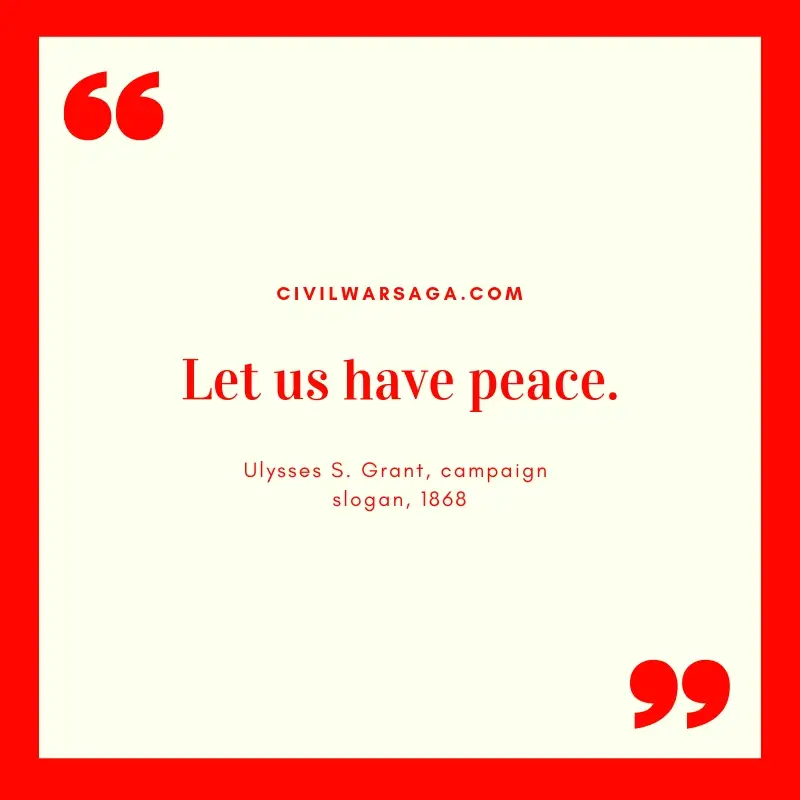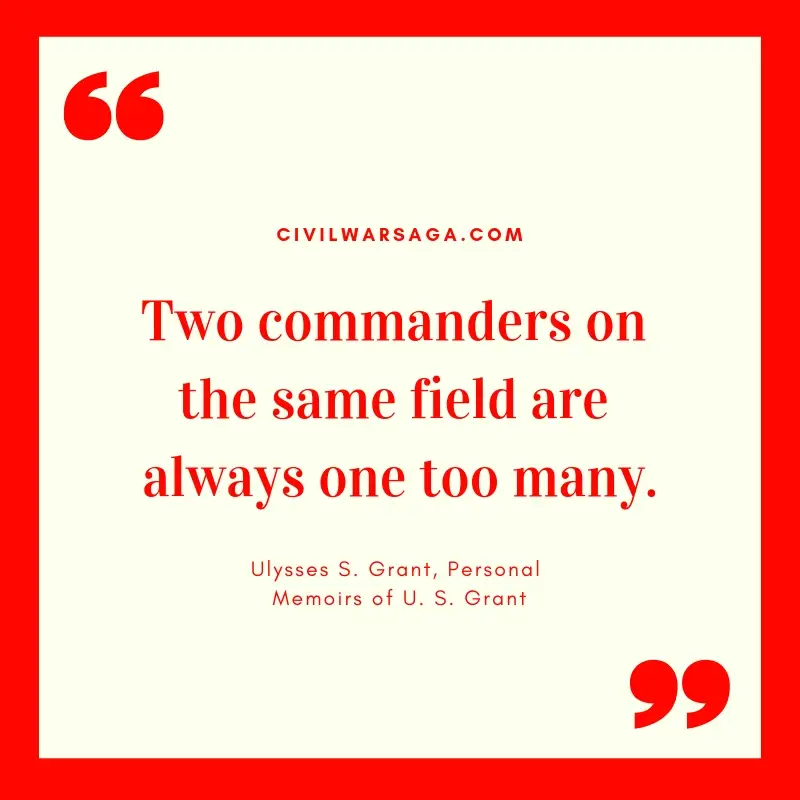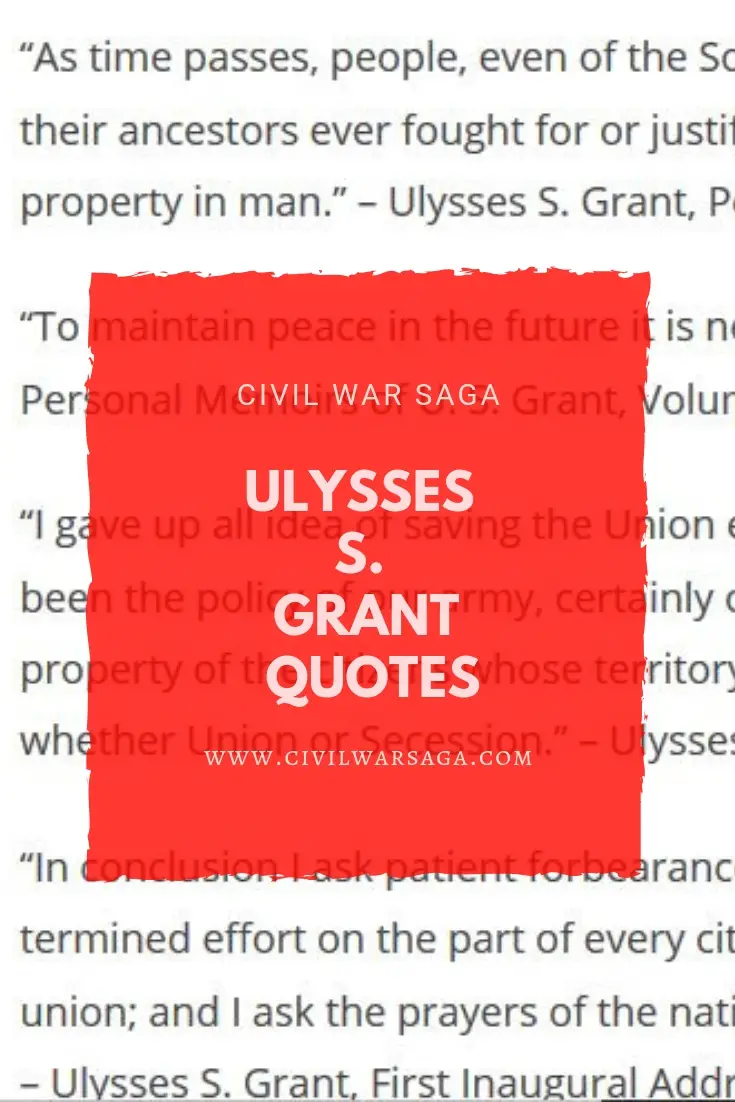Ulysses S. Grant was known as a quiet and stoic man who didn’t say much. Fortunately, his political speeches and autobiography have provide some very memorable quotes.
The following is a list of Ulysses S. Grant quotes:
“But my later experience has taught me two lessons: first, that things are seen plainer after the events have occurred; second, that the most confident critics are generally those who know the least about the matter criticised.” – Ulysses S. Grant, Personal Memoirs of U.S. Grant, Volume I
“Let us have peace.” – Ulysses S. Grant, campaign slogan, 1868
“Wars of extermination . . . are demoralizing and wicked,” – Ulysses S. Grant, second Inaugural Address, March 4, 1873
“The cause of the great War of the Rebellion against the United Status will have to be attributed to slavery. For some years before the war began it was a trite saying among some politicians that ‘A state half slave and half free cannot exist.’ All must become slave or all free, or the state will go down. I took no part myself in any such view of the case at the time, but since the war is over, reviewing the whole question, I have come to the conclusion that the saying is quite true.” – Ulysses S. Grant, Personal Memoirs of U.S. Grant, Volume II

“The natural disposition of most people is to clothe a commander of a large army whom they do not know, with almost superhuman abilities. A large part of the National army, for instance, and most of the press of the country, clothed General Lee with just such qualities, but I had known him personally, and knew that he was mortal; and it was just as well that I felt this.” – Ulysses S. Grant, Personal Memoirs of U. S. Grant, Volume I
“The distant rear of an army engaged in battle is not the best place from which to judge correctly what is going on in front.” – Ulysses S. Grant, Personal Memoirs of U. S. Grant, Volume I
“As time passes, people, even of the South, will begin to wonder how it was possible that their ancestors ever fought for or justified institutions which acknowledged the right of property in man.” – Ulysses S. Grant, Personal Memoirs of U. S. Grant, Volume I
“To maintain peace in the future it is necessary to be prepared for war.” – Ulysses S. Grant, Personal Memoirs of U. S. Grant, Volume II
“I gave up all idea of saving the Union except by complete conquest. Up to that time it had been the policy of our army, certainly of that portion commanded by me, to protect the property of the citizens whose territory was invaded, without regard to their sentiments, whether Union or Secession.” – Ulysses S. Grant, Personal Memoirs of U. S. Grant, Volume I
“In conclusion I ask patient forbearance one toward another throughout the land, and a determined effort on the part of every citizen to do his share toward cementing a happy union; and I ask the prayers of the nation to Almighty God in behalf of this consummation.” – Ulysses S. Grant, First Inaugural Address, March 4, 1869

“Two commanders on the same field are always one too many.” – Ulysses S. Grant, Personal Memoirs of U. S. Grant, Volume I
“General Lee was dressed in a full uniform which was entirely new, and was wearing a sword of considerable value, very likely the sword which had been presented by the State of Virginia; at all events, it was an entirely different sword from the one that would ordinarily be worn in the field. In my rough traveling suit, the uniform of a private with the straps of a lieutenant-general, I must have contrasted very strangely with a man so handsomely dressed, six feet high and of faultless form. But this was not a matter that I thought of until afterwards.” – Ulysses S. Grant, Personal Memoirs of U. S. Grant, Volume II
“It is possible that the question of a conflict between races may come up in the future, as did that between freedom and slavery before. The condition of the colored man within our borders may become a source of anxiety, to say the least. But he was brought to our shores by compulsion, and he now should be considered as having as good a right to remain here as any other class of our citizens.” – Ulysses S. Grant, Personal Memoirs of U. S. Grant, Volume II
“What General Lee’s feelings were I do not know. As he was a man of much dignity, with an impassible face, it was impossible to say whether he felt inwardly glad that the end had finally come, or felt sad over the result, and was too manly to show it.” – Ulysses S. Grant, Personal Memoirs of U. S. Grant, Volume II
“…but my own feelings, which had been quite jubilant on the receipt of his letter, were sad and depressed. I felt like anything rather than rejoicing at the downfall of a foe who had fought so long and valiantly, and had suffered so much for a cause, though that cause was, I believe, one of the worst for which a people ever fought, and one for which there was the least excuse” – Ulysses S. Grant, Personal Memoirs of U. S. Grant, Volume II
“The question of suffrage is one which is likely to agitate the public so long as a portion of the citizens of the nation are excluded from its privileges in any State. It seems to me very desirable that this question should be settled now, and I entertain the hope and express the desire that it may be by the ratification of the fifteenth article of amendment to the Constitution.” – Ulysses S. Grant, First Inaugural Address, March 4, 1869

“The much talked of surrendering of Lee’s sword and my handing it back, this and much more that has been said about it is the purest romance. The word sword or side arms was not mentioned by either of us until I wrote it in the terms.” – Ulysses S. Grant, Personal Memoirs of U. S. Grant, Volume II
“The country having just emerged from a great rebellion, many questions will come before it for settlement in the next four years which preceding Administrations have never had to deal with. In meeting these it is desirable that they should be approached calmly, without prejudice, hate, or sectional pride, remembering that the greatest good to the greatest number is the object to be attained.” – Ulysses S. Grant, First Inaugural Address, March 4, 1869
“The proper treatment of the original occupants of this land—the Indians one deserving of careful study. I will favor any course toward them which tends to their civilization and ultimate citizenship.” – Ulysses S. Grant, First Inaugural Address, March 4, 1869
“Mr. Lincoln gained influence over men by making them feel that it was a pleasure to serve him. He preferred yielding his own wish to gratify others, rather than to insist upon having his own way. It distressed him to disappoint others. In matters of public duty, however, he had what he wished, but in the least offensive way.” – Ulysses S. Grant, Personal Memoirs of U. S. Grant, Volume II
“’Man proposes and God disposes.’ There are but few important events in the affairs of men brought about by their own choice.” – Ulysses S. Grant, Personal Memoirs of U. S. Grant, Volume I
“My family is American and, and has been for generations, in all its branches, direct and collateral. Matthew Grant, the founder of the branch in America, of which I am a descendant, reached Dorchester, Massachusetts in May, 1630. In 1635, he moved to what is now Windsor, Connecticut, and was the surveyor for that colony for more than forty years.” – Ulysses S. Grant, Personal Memoirs of U. S. Grant, Volume I

“In the fifth descending generation my great grandfather, Noah Grant, and his younger brother, Solomon, held commissions in the English army, in 1756, in the war against the French and Indians. Both were killed that year.” – Ulysses S. Grant, Personal Memoirs of U. S. Grant, Volume I
“I have no recollection of ever having been punished at home, either by scolding or by the rod. But at school the case was different. The rod was freely used there, and I was not exempt from its influence.” – Ulysses S. Grant, Personal Memoirs of Ulysses S. Grant, Volume I
“During my first year’s encampment General Scott visited West Point, and reviewed the cadets. With his commanding figure, his quite colossal size and showy uniform, I thought him the finest specimen of manhood my eyes had ever beheld, and the most to be envied.” – Ulysses S. Grant, Personal Memoirs of U. S. Grant, Volume I
“For myself, I was bitterly opposed to the measure [Mexican-American War], and to this day regard the war, which resulted, as one of the most unjust ever waged by a stronger against a weaker nation. It was an instance of a republic following the bad example of European monarchies, in not considering justice in their desire to acquire additional territory.” – Ulysses S. Grant, Personal Memoirs of U. S. Grant, Volume I
“The Southern rebellion was largely
the outgrowth of the Mexican war. Nations, like individuals, are
punished for their transgressions. We got our punishment in the most
sanguinary and expensive war of modern times.” – Ulysses S. Grant,
Personal Memoirs of Ulysses S. Grant, Volume I
“I would not have the anniversaries of our victories celebrated, nor those of our defeats made fast days and spent in humiliation and prayer; but I would like to see truthful history written. Such history will do full credit to the courage, endurance and soldierly ability of the American citizen, no matter what section of the country he hailed from, or in what ranks he fought.” – Ulysses S. Grant, Personal Memoirs of U. S. Grant, Volume I
“The natural disposition of most people is to clothe a commander of a large army whom they do not know, with almost superhuman abilities. A large part of the National army, for instance, and most of the press of the country, clothed General Lee with just such qualities, but I had known him personally, and knew that he was mortal; and it was just as well that I felt this.” – Ulysses S. Grant, Personal Memoirs of U. S. Grant, Volume I
“It was generally believed that there would be a flurry; that some of the extreme Southern States would go as far as to pass ordinances of secession. But the common impression was that this step was so plainly suicidal for the South, that the movement would not spread over much of the territory and would not last long.” – Ulysses S. Grant, Personal Memoirs of U. S. Grant, Volume I
“Now, the right of revolution is an inherent one. When people are oppressed by their government, it is a natural right they enjoy to relieve themselves of the oppression, if they are strong enough, either by withdrawal from it, or by overthrowing it and substituting a government more acceptable. But any people or part of a people who resort to this remedy, stake their lives, their property, and every claim for protection given by citizenship – on the issue. Victory, or the conditions imposed by the conqueror – must be the result.” – Ulysses S. Grant, Personal Memoirs of U. S. Grant, Volume I
If you want to learn more about Ulysses S. Grant, check out the following article about the best books about Ulysses S. Grant.
Sources:
Grant. Ulysses S. Personal Memoirs of Ulysses S. Grant. Vol. 1, Charles L. Webster and Company, 1885.
Grant. Ulysses S. Personal Memoirs of Ulysses S. Grant. Vol. II, Charles L. Webster and Company, 1885.
“Inaugural Address.” The American Presidency Project, UC Santa Barbara, www.presidency.ucsb.edu/documents/inaugural-address-37
“Inaugural Address.” The American Presidency Project, UC Santa Barbara, www.presidency.ucsb.edu/documents/inaugural-address-36


